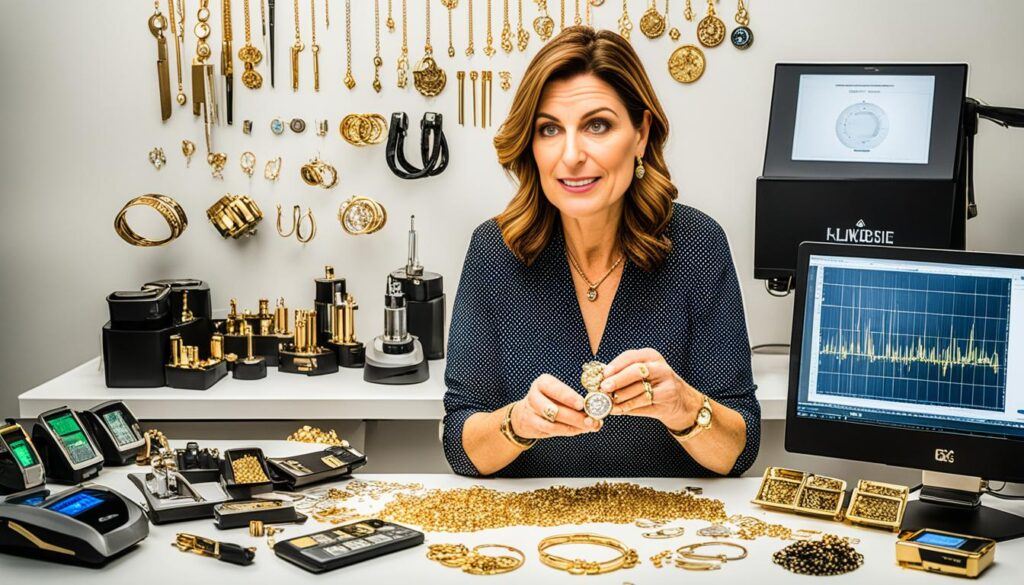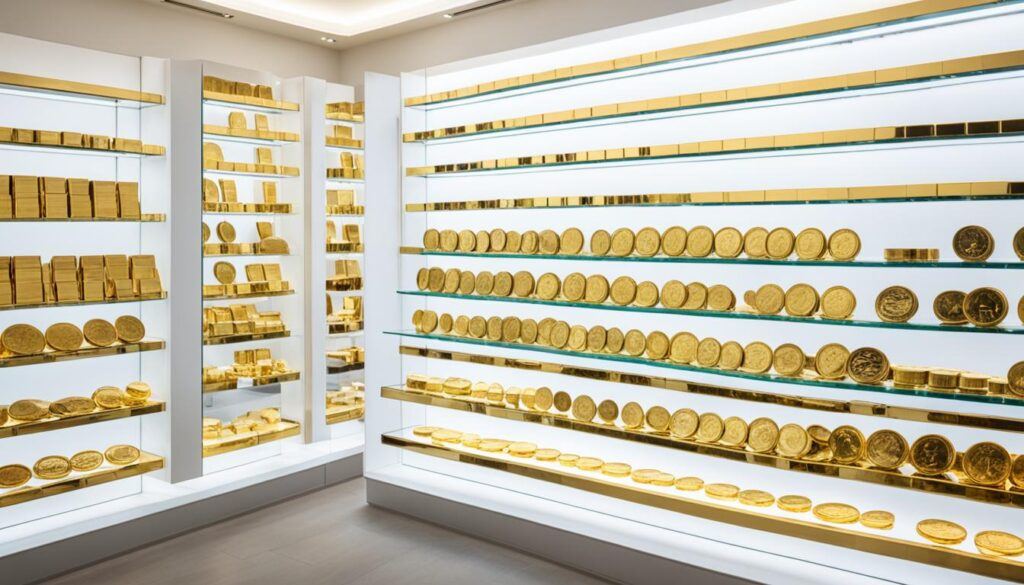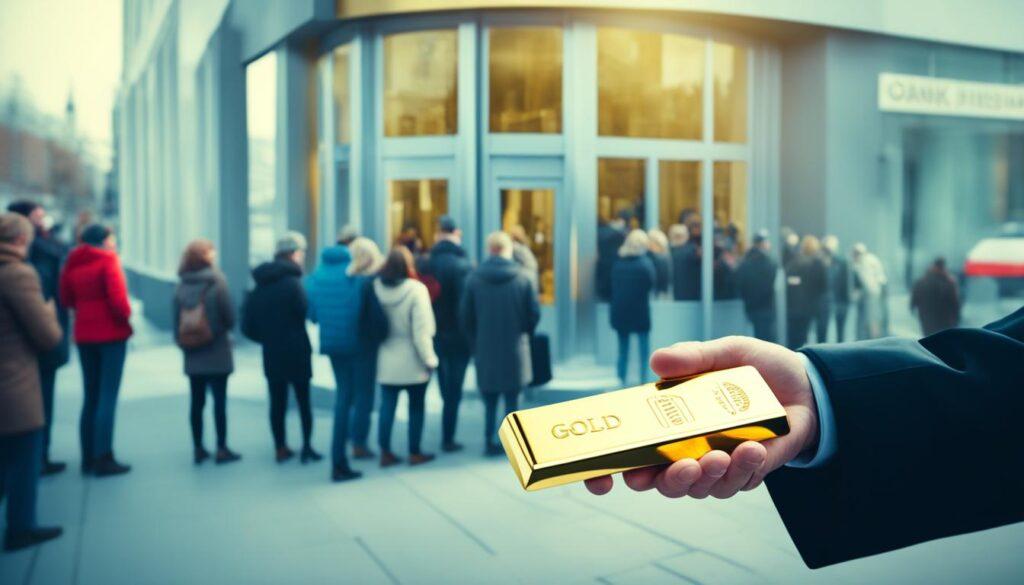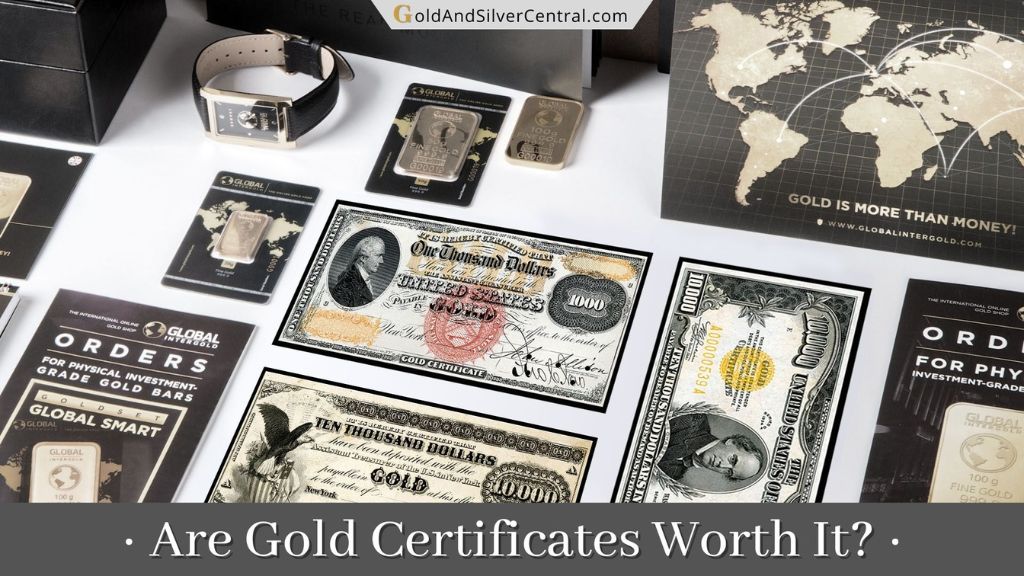Did you know that central banks around the world hold a significant amount of gold? For example, the United States alone holds over 8,100 tons of gold, which constitutes almost 78% of its total foreign reserves. It’s clear that gold plays a crucial role in the financial system, but what about the individual investor? Can you buy gold bars from banks? And if so, what are the challenges and considerations involved? In this article, we’ll explore the intricacies of banks purchasing gold bullion, the process of buying and selling gold bars, and alternative avenues for individual investors to explore.
Key Takeaways:
- Central banks hold a significant amount of gold as part of their foreign reserves.
- Individual investors face challenges when buying gold bars from banks, including extensive documentation requirements and limited product selection.
- Alternative avenues, such as trusted online dealerships, offer more convenience and a wider range of products for buying and selling gold bars.
- When selling gold bars to banks, an assay or certificate of authenticity is usually required to ensure the quality and authenticity of the gold.
- Research and due diligence are important when buying gold, regardless of the purchasing avenue.
Can Individuals Purchase Gold or Silver from Banks?
Buying gold or silver directly from a bank might seem like a straightforward approach, but the process can be complex for individual investors. It typically involves the following steps:
- Initial Inquiry: You will need to submit an application or request form to the bank, specifying the type and amount of precious metal you wish to purchase.
- Documentation: Banks require specific documents to verify your identity and residence, along with a declaration of the source of funds.
- Approval Process: The bank will thoroughly check the submitted documents and assess the associated risks before approving your purchase.
- Product Availability: Banks usually have a limited selection of precious metals, typically offering standard bullion bars.
- Pricing: Prices offered by banks may be based on the current market rate, but additional premiums could be charged.
- Payment and Purchase: Once the price is agreed upon, you can make payment through a direct bank transfer or other approved methods.
- Collection: After the purchase, you are responsible for collecting the precious metals. This can be done through secure delivery options or by arranging for collection and transportation.
However, it’s important to note that the process of buying from banks can often be lengthy and cumbersome compared to other purchasing avenues.
The Benefits of Buying Silver and Gold from an Online Dealership
When it comes to investing in precious metals like gold and silver, buying from an online dealership offers a range of benefits that make it a convenient and reliable option. With just a few clicks, you can access a wide selection of gold and silver products, allowing you to find exactly what you’re looking for without leaving the comfort of your home.
Here are some key advantages of buying gold and silver from an online dealership:
- Convenience at Your Fingertips: Online dealerships provide the flexibility to browse, compare, and purchase precious metals at any time and from anywhere. No need to visit multiple brick-and-mortar stores or deal with limited operating hours.
- Extensive Product Selection: Online dealerships usually have a vast inventory, offering a wide range of gold and silver products. Whether you’re looking for bullion bars, coins, or rare items, you’ll find a comprehensive selection to choose from.
- Competitive Pricing: Online dealerships often offer more competitive prices compared to physical stores. With lower overhead costs, they can pass on the savings to customers, allowing you to potentially get more value for your investment.
- Educational Resources: Reputable online dealerships provide valuable educational resources to help investors make informed decisions. These resources include articles, guides, and FAQs that cover various topics related to buying, selling, and storing precious metals.
- Secure and Insured Deliveries: Online dealerships prioritize the security and safety of your precious metal purchases. They partner with trusted shipping carriers to ensure that your order is securely packaged and fully insured during transit. This gives you peace of mind knowing that your investment is protected.
- Transparent Customer Reviews: Online platforms allow for transparency through customer reviews and testimonials. Before making a purchase, you can read about the experiences of other customers, helping you gauge the reputation and credibility of the online dealership.
- Personalized Customer Service: Online dealerships are known for providing personalized customer service. Whether you have a question about a specific product or need assistance with an order, you can reach out to their dedicated customer support team through live chat or helpline. They are there to address any queries or concerns promptly.
As you can see, buying silver and gold from an online dealership offers convenience, extensive product selection, competitive pricing, educational resources, secure deliveries, transparent customer reviews, and personalized customer service. It’s an advantageous and reliable way to invest in precious metals while enjoying a seamless and hassle-free buying experience.
So why not explore reputable online dealerships today and start building your portfolio of precious metals?
In my experience, buying gold and silver from online dealerships has been incredibly convenient and beneficial. The wide selection of products, competitive prices, and secure deliveries have made the process smooth and reliable. I highly recommend exploring trusted online dealerships for your precious metal investments.
Do Banks Accept Gold Bars and Coins?
While some banks do accept gold bars and coins, the acceptance may vary. In the United States, most banks do not buy precious metals, including gold. Commercial banks may be more likely to offer this service, but savings or cooperatives are unlikely to do so. Central banks may allow customers to sell gold bars or coins, but not all do, and they may only accept gold at face value. Banks typically only accept gold in coin or bullion form and require a letter of authenticity certificate. The level of tarnish on gold does not usually affect its price, but it’s important to ask the bank about their acceptance criteria. When selling gold bullion to a bank, an assay or certificate of authenticity is usually required to ensure the quality and authenticity of the gold.
What Gold Products Do Banks Accept?
Banks generally accept gold in the form of coins or bullion bars. These products are easier to authenticate and assess for weight and purity compared to other forms of gold such as jewelry or collectibles. Coins sold to banks usually need to be from respected mints or official distributors to ensure their authenticity and quality. The specific coins or bullion bars that banks accept may vary from one institution to another, so it’s advisable to inquire with the bank beforehand.
Official Distributors
When purchasing gold bars or coins, it’s important to ensure that they come from official distributors or reputable sources. Official distributors are authorized sellers who have met specific standards and norms set by governing bodies or mints. They guarantee the authenticity and quality of the gold products they offer. Buying gold from official distributors reduces the risk of acquiring counterfeit or low-quality gold.
Tarnished Gold
The level of tarnish on gold typically does not affect its price or acceptability by banks. However, it’s advisable to consult with the bank about their acceptance criteria for gold with tarnish. Banks may have specific rules or requirements regarding the condition of gold bars or coins they accept.
Letter of Authenticity Certificate and Assaying
When selling gold to a bank, a letter of authenticity certificate is usually required to provide evidence of the gold’s origin and authenticity. This certificate is obtained through a reputable assayer who evaluates the gold to determine its quality and verifies its authenticity. The assayer may conduct several tests, including assessing the gold’s purity, weight, and other characteristics. The letter of authenticity certificate, along with the assay report, ensures that the bank can confidently accept the gold as genuine and accurately assess its value.
| Gold Product | Accepted by Banks |
|---|---|
| Gold Bars | Yes |
| Gold Coins from Official Distributors | Yes |
| Gold Jewelry | No |
| Collectible Gold Coins | Depends on the Bank |
Note: The table above provides a general overview of the acceptability of gold products by banks. It’s advisable to consult with the specific bank regarding their acceptance criteria and policies.
What You Need to Do Before Selling Your Gold
Before selling gold, there are important steps to take to ensure a smooth and profitable transaction. From understanding the current spot price to proper storage and handling, these preparations are essential to make the most out of your gold sale.
- Check the Current Spot Price: The first step in selling gold is to determine its value by checking the current spot price. The spot price is the market price for immediate delivery of gold at the current moment. Various financial websites provide up-to-date spot prices, allowing you to gauge the value of your gold accurately.
- Get an Appraisal: To know the exact worth of your gold jewelry or coins, it’s advisable to get an appraisal from an authorized jeweler or business. An appraisal provides an unbiased evaluation of your gold’s quality and can significantly impact the selling price.
- Proper Storage and Handling: Maintaining the condition of your gold is crucial for maximizing its value. Store your gold in secure sleeves, cases, or safety deposit boxes to prevent damage and scratches. When handling gold, always wear cotton gloves or use soft cloths to avoid leaving fingerprints or other marks.
- Timing the Sale: The timing of selling gold is essential to maximize profits. Gold prices fluctuate daily due to various market factors. It’s wise to observe and analyze market trends before deciding the ideal time to sell your gold.
- Taxes on Selling Physical Gold: It’s crucial to consider the tax implications when selling physical gold. In the United States, profits from selling gold are subject to capital gains tax. Seek advice from a financial advisor to explore ways to minimize capital gains taxes, such as considering paper assets instead of physical gold.
By following these steps and conducting thorough research, you can confidently proceed with selling your gold and ensure a successful transaction.

Can You Sell Gold Coins to the U.S. Mint?
Contrary to popular belief, the U.S. Mint does not directly buy gold coins from private individuals or dealers. Instead, the Mint operates through a network of authorized purchasers who act as intermediaries between the Mint and the public.
“The U.S. Mint does not buy gold coins from private individuals or dealers.”
Authorized purchasers are entities that meet specific criteria set by the U.S. Mint. These authorized purchasers have established relationships with the Mint and are responsible for buying precious metals from the Mint and distributing them to the public. They play a crucial role in ensuring the efficient distribution of U.S. Mint products.
Buying Gold from U.S. Mint: The U.S. Mint offers an extensive catalog of gold products through its authorized distributors. These products include gold bullion coins, such as the American Gold Eagle and the American Gold Buffalo. The U.S. Mint also produces gold commemorative coins and numismatic gold coins, which are popular among collectors.
| Catalog of Gold Products Offered by U.S. Mint |
|---|
| American Gold Eagle |
| American Gold Buffalo |
| Commemorative Gold Coins |
| Numismatic Gold Coins |
Ensuring Authenticity and Purity: When purchasing gold coins from the U.S. Mint or its authorized distributors, it is crucial to ensure the authenticity and purity of the coins. The U.S. Mint is known for its commitment to quality and produces coins with specific weight, content, and design standards. However, it is always recommended to buy from reputable sources and verify the authenticity of the coins through independent experts or professional appraisers.
Therefore, while selling gold coins directly to the U.S. Mint is not possible, individuals can explore authorized purchasers or the U.S. Mint’s extensive catalog of gold products for their buying needs.
Stay tuned for the next section, where we will discuss the various options available for buying gold bars and coins.
Where to Buy Gold Bars and Coins
When it comes to purchasing gold bars and coins, there are several options available. Whether you prefer the convenience of online shopping, the personal touch of local retailers, or the reliability of banks, each option has its own advantages and considerations to keep in mind.
Licensed Online Retailers
One of the most popular choices for buying gold bars and coins is through licensed online retailers. These platforms offer convenience and accessibility, allowing you to browse a wide range of products from the comfort of your own home. Licensed online retailers often have a vast inventory of gold bars and coins, providing you with numerous options to choose from. Additionally, these retailers often offer competitive pricing and transparent information regarding product availability and pricing.
Local Precious Metal Retailers
If you prefer a more hands-on approach, purchasing gold bars and coins from local precious metal retailers may be the right option for you. Visiting a brick-and-mortar store allows you to physically inspect the gold and seek direct assistance from knowledgeable staff members. This personal touch can help ensure that you are making an informed decision and selecting the right type and quality of gold. However, it’s important to research and choose reliable and reputable local retailers to avoid any potential issues.
Banks
Another option for buying gold bars and coins is through banks. While banks may have a more limited selection compared to online retailers and local stores, they offer the advantage of being regulated institutions, providing a certain level of public accountability. If you prefer the peace of mind that comes with buying from a bank, it’s important to inquire about their available gold products and any specific requirements or procedures. However, it’s worth noting that banks may have restrictions on the types and quantities of gold they can sell.
Factors to Consider in Buying Gold
Regardless of where you choose to buy gold bars and coins, there are important factors to consider in order to make a well-informed decision:
- Purity: Ensure that the gold you are buying is of the desired purity, usually expressed in karats or fineness.
- Weight: Consider the weight of the gold bar or coin to determine its value and suitability for your investment goals.
- Authenticity: Verify the authenticity of the gold by checking for proper hallmarks or certifications.
- Premium over the Spot Price: Take into account the premium charged over the current spot price of gold, as this can vary depending on the retailer or dealer.
By carefully considering these factors and exploring the various buying options, you can confidently purchase gold bars and coins that align with your investment objectives and preferences.

Conclusion
Buying and selling gold bars can be a rewarding investment strategy for individuals. However, it is essential to navigate the process carefully and consider various factors before making a decision.
One of the challenges of buying from banks is the extensive documentation requirements and limited product selection. While banks do buy gold bars and coins, individual investors may find it more advantageous to explore alternative avenues, such as trusted online dealerships.
Online dealerships offer numerous benefits, including the convenience of browsing and purchasing from the comfort of one’s home. They provide competitive pricing, extensive product selection, and secure deliveries, making it easier for individuals to buy and sell gold bars. Additionally, reputable online dealerships often provide educational resources to help investors make informed decisions.
Regardless of where individuals choose to buy gold bars, conducting thorough research and due diligence is vital. Understanding factors such as purity, weight, authenticity, and the current spot price of gold is essential in making informed investment decisions.
By carefully considering these factors and exploring alternative avenues like online dealerships, individuals can navigate the world of buying and selling gold bars more effectively, maximizing their investment potential.
FAQ
Do Banks Buy Gold Bars?
While some banks do accept gold bars and coins, the acceptance may vary. It is recommended to inquire with your local bank regarding their policies on purchasing gold.
Can Individuals Purchase Gold or Silver from Banks?
Yes, individuals can purchase gold or silver from banks. However, the process can be complex and may involve extensive documentation requirements and limited product selection. It is advisable to explore alternative avenues such as trusted online dealerships.
What are the benefits of buying silver and gold from an online dealership?
Buying gold and silver from an online dealership offers convenience, an extensive product selection, competitive pricing, valuable educational resources, secure and insured deliveries, transparency through customer reviews, and personalized customer service.
Do Banks Accept Gold Bars and Coins?
While some banks accept gold bars and coins, it depends on the individual bank’s policies. Banks typically only accept gold in coin or bullion form and may require a letter of authenticity certificate. It is advisable to check with your local bank regarding their acceptance criteria.
What do I need to do before selling my gold?
Before selling your gold, it is essential to check the current spot price, get an appraisal from an authorized jeweler or business, ensure proper storage and handling, time the sale to maximize profits, and consider the taxes involved, such as capital gains tax.
Can I sell gold coins to the U.S. Mint?
No, the U.S. Mint does not buy gold coins from private individuals or dealers. The U.S. Mint works through authorized purchasers who act as intermediaries between the Mint and the public.
Where can I buy gold bars and coins?
You can buy gold bars and coins from licensed online retailers, local precious metal retailers, and certain banks. It is important to conduct thorough research and due diligence before making a purchase.



